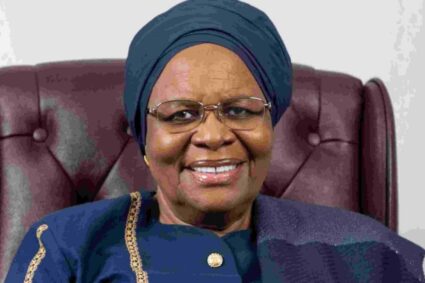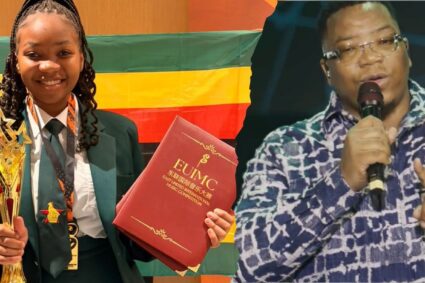
Chiedza Nyanyiwa is the founder of “Children’s Republic” that works across Zimbabwe with children in underserved communities and now she is an author. She recently put pen to paper and put together a collection of essays titled “The Covenant of Life and other essays”. The book shares on Christianity, Christian beliefs, and spirituality. Nyanyiwa was generous to share some information on the book with us.*CN – Chiedza Nyanyiwa, KM – Kudzai Mhangwa
KM: Hats off to you for the release of your book! Please introduce us to the person behind the book. Who is Chiedza Nyanyiwa?
CN: Thank you very much. I suppose like everyone else there is no one dimension to who I am. I am multi-layered and like a tree I have many branches each holding an aspect of what makes me who I am. I am a daughter, a granddaughter, a sister and a friend. I am a writer, an avid reader, a lover of art and music, a Christian as well as a humanitarian worker.
KM: Where did you get the inspiration to release a book?
CN: Writing like any other art form comes with a compulsion for self-expression. It is that compulsion that drove me to release a book. There are aspects of my thought processes and experiences at certain points in my life in the book and the need to release it comes from the desire to display those aspects. It is daunting, but as a writer it is also necessary.
KM: Has becoming an author always been on the cards for you?
CN: Yes. I have wanted to be an author since I read ‘Nervous Conditions’ by Tsitsi Dangarembga when I was fifteen [years old]. I fell in love with literature then and there were all these stories and these worlds that were so familiar yet peculiar to the people who wrote them that I started writing my own stories and issues I was passionate about and set out to bring them to life.
KM: The book is a collection of essays. Where the essays written at different points or you wrote them all deliberately to be an anthology?
CN: The essays were written over a long period of time. All of them were birthed from particular questions about religion I had over the years. The intention was not for them to be one body of work but when I had them all they flowed together so well that it made sense to put them into one collection of essays.
KM: Tell us about “The Covenant of Life and other essays”. What can readers expect?
CN: The book is a reflection of my own journey towards trying to understand the world better from a Christian worldview. The essays are a product of questions that I had and the quest to those answers became a series of essays over the years. The anthology is divided into three parts.
The first part has five essays and these are of a more theological nature. The book opens with the title essay ‘The Covenant of Life’. If I were to come up with a question that gave birth to that essay it would be ‘How does the Bible and the Jewish history point to Christ?’ The Bible being divided into Old and New Testament but a certain disconnection is created making the two books seemingly exclusive. As I started doing research I realized that from the first utterance in the Bible to the last, everything points to Christ. So the ‘Covenant of Life’ looks at Christ as the fulcrum in history, the centrepiece and the hinge that holds everything and without whom nothing makes sense. It centres around the role of Christ in history and how the Jewish history points to Him, how it lays down a foundation for Him. The second essay is titled ‘Exodus’ and as the name suggests with this one the motivation was to understand Christ as foreshadowed in the book of Exodus. It is a story that almost everyone knows but how does it reflect Christ. Slavery as a state mirrors the human condition and we find Christ as the promise throughout. The third essay is titled ‘Leviticus’ and as the name suggests it is an analysis of the Jewish priesthood. It was really very interesting to write and it is one of my favourites in the collection. The focus here was on Israel’s growth as a nation having multiplied in Egypt and obviously picking up Egyptian culture. The essay looks at how God set out to unwavering that culture tapestry and replacing it with His own design and of course how the institution of Levitical priests points to Christ as the ultimate High Priest. This essay is followed by ‘House of Dawn’ which draws contrasts between the house of Saul and the house of David again with the intention of understanding Christ as king. The final essay [in part one] is ‘Song of a Barren Woman’ and it looks at the place of women in the Bible.
Part two of the anthology is titled ‘Being’ which by definition means the fundamental nature of something or the state of existence. With ‘Being’ the question that drove me to it was ‘What is God’s design for the world?’ The essay explores the question of human nature, the possibility of creating perfect societies, issues of politics, justice, human rights, economics as well as war and pacifism from a Christian worldview.
Finally, part three of the anthology is titled “The Builders of the House” and it is a defense of Christian involvement in the public space. We live in a world in which postmodern reasoning and secular morality in the public sphere excludes Christianity without considering how many of the human rights ethics the modern world is built on come directly from Judeo-Christian ethics. This essay looks at the history of the church and how it has contributed to justice, peace and progress over the centuries. That in essence is what’s inside the anthology.
KM: Why a book on Christianity?
CN: I think everyone at some point comes to these existential questions and struggles to make sense of the world riddled by so many problems from war, poverty, injustice and the likes. We sometimes have moments of fatalism and also being daunted by thoughts of oblivion. We can be consumed by our own self-importance or be overwhelmed by our insignificance. I suppose as long as you are alive there are these big questions you are bound to ask. I see Christianity not as a religion but as an explanation of the world and the answer to these big daunting questions. Perhaps this seemingly naïve certainty comes from having grown up a Christian. However, when it came time to find God on my own, I found within Christianity the answers to these questions of existence and the purpose of it, the world and the essence of it. The questions about the problem of evil and what an ideal world would look life from a Christian worldview were a tangled thread and writing this book presented me an opportunity to untangle those threads and find a pattern that made sense to me.
KM: What is your take or opinion on the role of the church today?
CN: I feel the church which by definition means that which belongs to God has largely set its eyes on the individual instead of the collective purpose it has both to the world and to God. Really if we were in the early church, we would probably be getting an unflattering letter from the Apostle Paul. The church is the greatest force by which the world can be changed but it is choked by many ideologies, ambitions and a certain blindness to the simplistic perfection of the Gospel. As long as the church has nothing to say to the issues going on around the world, not just to say but to do as well, in terms of speaking for peace and standing for justice it is in danger of seeming irrelevant. At the same time, it is not hopeless because ten to one there are as many who still hold on to the true Gospel and as long as the church belongs to God, He is powerful enough to shepherded it to the right pastures.
KM: You know Chiedza, in my opinion we are living in a time where Christianity and our belief is under fire partially because of the shocking revelations on church leaders and some of their actions. It’s almost too much to bear. What is your opinion?
CN: That is troubling indeed especially when it’s leaders who are the cause of disquiet. The fish rots from the head as the saying goes. But I think the church should learn to put God before pastors and the true gospel before grand revelations. The church need not fall with the fall of it’s leaders though that’s a simple notice because being human it’s bound to have an effect. But still Christ as the head of the church should be the first and final port of call.
KM: Not only are you a debutante author, you are the founder of “Children’s Republic”. Has your work in philanthropy fed into this book in any way?
CN: Yes absolutely. A significant part of the book looks at the role of the church in changing the world. I admit that my own passion for humanitarian work comes from the desire to heed the Christian call to be a defender of justice and a lover of peace. I looked into issues of justice and human rights from a Christian point of view because of my interest in humanitarian work.
KM: Any advice for aspiring authors?
CN: My advice would be just write the stories that resonate with you because there are billions of voices in the world but only one belonging to you. I’ve read works by many authors and none sound the same. So aspiring authors should find their own unique voice and stay true to that.
KM: Chiedza we celebrate you and hold you in the light! It was such a delight speaking to you. What are your final words for the readers?
CN: Thank you very much for having me. It is truly humbling and I am grateful especially because it is my first published book. It means the world. My final words, if you’ve come this far with the article then thank you for your time and interest. I hope you get my book and enjoy reading it as much as I enjoyed writing it.
“The Covenant of life and other essays” will be published in March under Zimbabwe’s Phoenix Publishing House and will be made available on Amazon.




